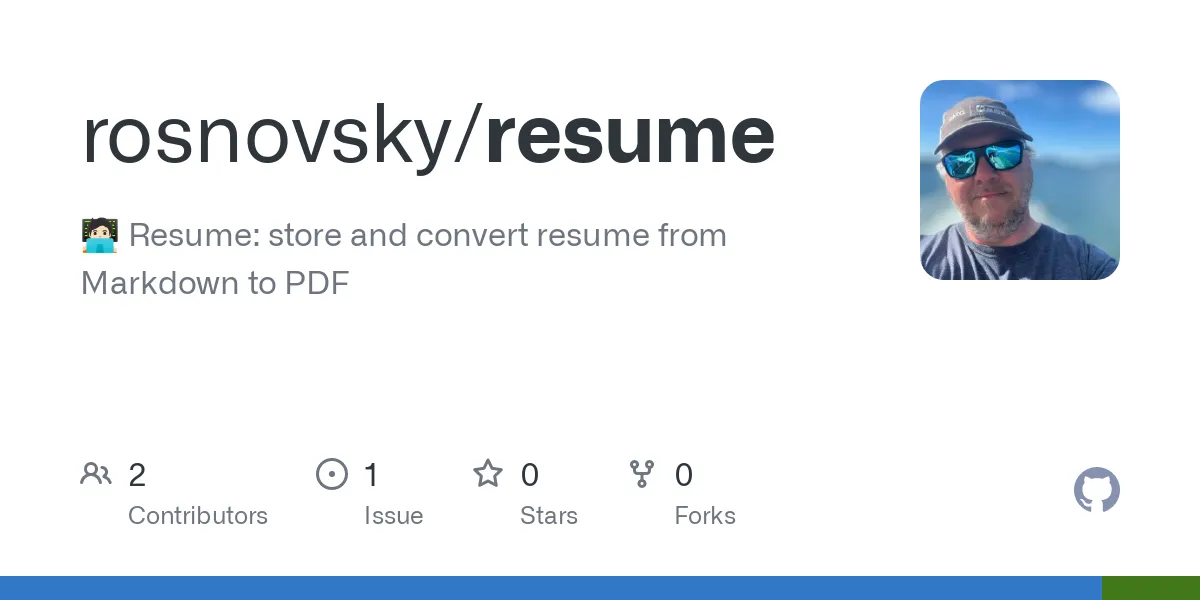Resume automation
Being recently laid off, I expect to send out hundreds of job applications in coming weeks and months. Why not make working with resume updates as convenient as possible?

On February 1, 2024, I was laid off from Okta. My position at the company was eliminated along with 400 other positions. I’ll post about it later; dozens of absolutely incredible people were discarded along with yours truly, and I want to do justice telling our story. If you’re interested and inpatient, Joey deVilla 🪗 had just posted Laid off in 2024, part 1: The 15 worst minutes of 2024, followed by 15 more, worth reading, I promise!
Anyway.
Applying for jobs sucks, it’s no secret, is it? One of the parts that frustrated me in the past was that I need to tweak my resume to highlight skills and experience for a given position. When you only have, like, 2 pages at most to describe everything you have to offer, it’s critical that you highlight what matters for a specific job you’re applying for.
Given that last time I was looking for a job in 2019, I’ve sent out over 100 resumes, I expect to send out hundreds of job applications in coming weeks and months. Why not make working with resume updates as convenient as possible?
So, here’s what I came up with when it comes to my resume workflow for this round of job hunting:
- I want an easy way to adjust my resume from anywhere, on any device, in any way I want
- I want to have full version control for the changes I make
- I want the system to automagically organize my resume versions across prospective employers
- I want to have a bit of fun with it, too
Markdown FTW
Markdown is great. It’s easy to write, it’s readable to both humans and machines, it’s easy to convert to other formats too, and there are a ton of tools to work with it.
So let me write my resume in Markdown.
# Art Rosnovsky
## Software Engineer
> [email protected] | [github.com/rosnovsky](https://github.com/rosnovsky) | Washington state | **Remote Only** |
Dedicated `JavaScript`/`TypeScript` Engineer with a knack for ` React`, `Kubernetes`, and CI/CD. I champion sustainable, ethical tech that makes a positive impact, by building stable, scalable, efficient, and maintainable software.
## Technical Skills
- **Front End**: `JavaScript`, `TypeScript`, `React`, `Svelte`, `Tailwind`, `CSS`, `HTML`
- **Back End**: `Node.js`, `Express`, `Next.js`, `MongoDB`, `PostgreSQL`, `tRPC`, RESTful APIs
- **Dev Tools/DevOps**: Git, `Docker`, `Kubernetes`, `Jira`, `AWS`, `Azure`, CI/CD (`GitHub Actions`, `Gitlab Pipelines`)
- **Other**: former frontline reporter, can fly single-engine aircraft
[... the rest of the resume ...]
Markdown to PDF
”Please attach you resume in Markdown format”, said no one ever. So I need to convert my resume to PDF. I mean, I need to convert every edit to PDF. I then need to store this every edit in such a way that I won’t mix them up and send the wrong one to a potential employer.
There are many different ways to convert Markdown to PDF. The proper one I should’ve used is with pandoc. But I’m not a proper person, so I went with md-to-pdf package for Node.js: it’s just easier to use out-of-the-box.
import mdToPdf from 'md-to-pdf';
export const markdownToPdf = async (inputFilePath: string) => {
try {
const pdf = await mdToPdf({ path: inputFilePath });
return pdf;
} catch (error: any) {
console.error(`Error occurred: ${error.message}`);
throw error;
}
}
If a recruiter asks for a resume in
.docxor some other exotic/proprietary format, it’s a huge red flag. I’ll pretend I’m bad at following instructions and send them a PDF anyway.
Git for version control
Now that I’ve got my resume in Markdown, converted it to PDF, I need to store it somewhere. Just kidding, it’s right there in a folder in the Github repo. I can download the PDF to send it over to someone, or I can just send them a link to the repo (or directly to the .pdf file).
I can have branches for every job I’m applying for. I can go back in time to a particular version of the resume that performed better. I can see changes made over time. It’s all there, in the repo.
Fun with it
I’m not doing any of the above by hand. What am I, some caveman?! Github Actions to the rescue! Whenever I push an update to the resume, it triggers a workflow that converts the resume to PDF and stores it in the repo. It’s not perfect (there are quirks preventing me from easily implementing branch protection rules, paths are a bit wonky when it comes to tests, this sort of thing), but it’s a start.
name: Generate PDF from resume
on:
push:
paths:
# I don't want the workflow to run UNLESS I've updated the actual resume content
- "resume.md"
# I want to be able to trigger the workflow manually, if needed
workflow_dispatch:
inputs:
reason:
description: "Re-generate resume PDF"
required: false
default: "Manual trigger"
permissions:
contents: write
jobs:
generate-pdf:
runs-on: ubuntu-latest
steps:
- name: Check out repository
uses: actions/checkout@v4
- name: Set up Node.js
uses: actions/setup-node@v4
with:
node-version: "20.5.0"
- name: Install dependencies
run: npm install -g pnpm && pnpm install
- name: Generate PDF
run: pnpm build
- name: Commit PDF
run: |
git config --global user.name "${{ github.actor }}"
git config --global user.email "${{ github.actor}}@users.noreply.github.com"
git add output/art_rosnovsky_software_engineer.pdf
git commit -am "feat: update resume PDF"
git push
Check it out
I’m sure there are many ways to improve it, and I’d love to hear your thoughts on it.